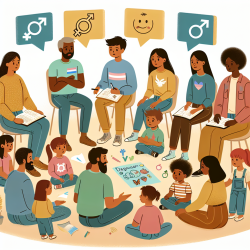The study involved 21 qualitative interviews with parents, TNB youth, and healthcare affiliates. It revealed that parents often face significant knowledge deficits regarding gender and sexual health for TNB individuals. Parents expressed concerns about the long-term impacts of medical interventions and desired greater understanding of gender and sexuality to support their children through their social transition to their affirmed gender identity.
Based on the study's findings, here are some key strategies practitioners can implement to improve outcomes for TNB youth:
- Develop Comprehensive Educational Curricula: Create educational materials that cover the basics of gender and sexuality, diverse narratives of TNB experiences, gender dysphoria, non-medical and medical gender-affirming interventions, and resources for peer support. Providing parents with accurate information can help them facilitate affirming conversations with their children.
- Encourage Parental Self-Education: Parents should be encouraged to seek out information independently. This reduces the burden on TNB youth to educate their parents and ensures that parents are well-informed to support their children effectively.
- Facilitate Peer Support Networks: Establishing peer support groups for parents can provide them with a platform to share experiences, seek advice, and process complex emotions. This can help parents feel less isolated and more confident in supporting their TNB children.
- Provide Access to Healthcare Professionals: Healthcare professionals play a crucial role in educating parents about gender-affirming care. Practitioners should ensure that parents have access to knowledgeable and supportive healthcare providers who can address their concerns and provide accurate information.
- Address Emotional and Psychological Needs: Parents often experience a range of emotions, including grief, guilt, and confusion, when their child comes out as TNB. Providing resources and support to help parents process these emotions is essential for fostering a supportive and affirming environment for TNB youth.
Implementing these strategies can significantly improve the support that parents provide to their TNB children, ultimately leading to better mental and physical health outcomes for TNB youth. As practitioners, it is our responsibility to stay informed about the latest research and apply these insights to our practice.
To read the original research paper, please follow this link: Gender and Sexual Health-Related Knowledge Gaps and Educational Needs of Parents of Transgender and Non-Binary Youth.










